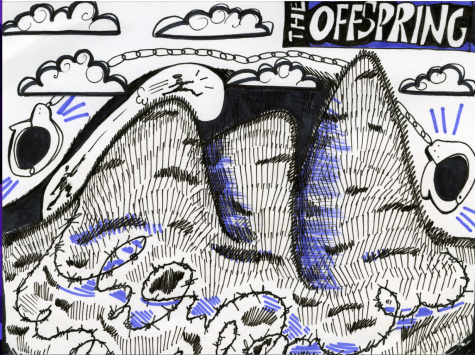“I’ll see you in Walla Walla”: Students react to “Walla Walla” by The Offspring
November 11, 2021
Apart from our dry, humble home boasting over 100 wineries, “Walla Walla” is the title of The Offspring’s eighth song on their 1998 album “Americana.” Why Walla Walla? There’s a rather large penitentiary here that supposedly housed the misguided subject of this song, an ex-friend of the author.
The song itself has good rhythm and a strong chorus, according to sophomore Noah Giese, who would rate it a 7/10.
“I just like rock,” he explained.
At 172 bpm (beats per minute), “Walla Walla” boasts fast-paced drums and a guitar riff that, while memorable, sounds like it belongs in the first tier of song selections in Guitar Hero. The lyrics are repetitive but catchy, and following the theme of “Americana” (basically just “America core”), they act as a patronizing farewell to the songwriter’s prison-bound friend.
First-year Jenna Ebding described the song as “chaotic.”
“Compared to their other songs, I rate it a 7/10, but as a normal song, we’ll give it a solid 7.5,” Ebding said.
She explains that while she’s less connected to this song in comparison to some of their older music, it’s still pretty good, despite being “a little gimmicky.”
One of the lyrics states, “I’ll see you in Walla Walla / Folsom prison is the destination,” which is a surprise given that Folsom prison is all the way in California.
“The biggest critique is…maybe get the prison right, you know,” Ebding said.
First-year Alicia Fogarty was not so ready to dish out praise. She rated the song a 4/10, stating, “I’m not a big fan of harsh rock, and I don’t like Walla Walla being known for its big prison. Fuck the prison industrial complex!”
Despite her stance being somewhat controversial, she raises a fair point.
“I find making light of someone going to prison a little tone-deaf, and the song is just repetitive,” Fogarty said.

The lyrics she’s referring to state, “I guess no one told you how to get a life/I’m afraid you can’t talk your way out of this one, son/ Now four walls are your 24-hour-a-day, constant companions.”
Fogarty pointed out that the condescending sentiment seems to place a great deal of blame on the incarcerated. This is consistent with the sentiments of the time it was written (1998), shaped by the Ronald Reagan Anti-Drug Abuse Acts, Lyndon Johnson’s Safe Streets Act of 1968 and the very recent Violent Crime Control and Law Enforcement Act (1994 Clinton Crime Bill) that all contributed to a rising incarceration rate and increased funding for law enforcement.
Giese interpreted the lyrics differently though: he felt that while the song is about a serious subject, “the speaker lightly commiserates.”
Similarly, Ebding didn’t share these political qualms, stating, “They’re a good musical group and I think the song is just another one of their many good songs.”
Regardless of how the lyrics are taken, the debate around incarceration and rehabilitation is ongoing and unique to America, the country with the highest incarceration rate and the largest number of prisoners. This late ’90s jam serves to show just how prevalent and deeply rooted attitudes around imprisonment have been, and the different interpretations of this song are symbolic of how even today, prison is a deeply relevant part of “Americana.”




